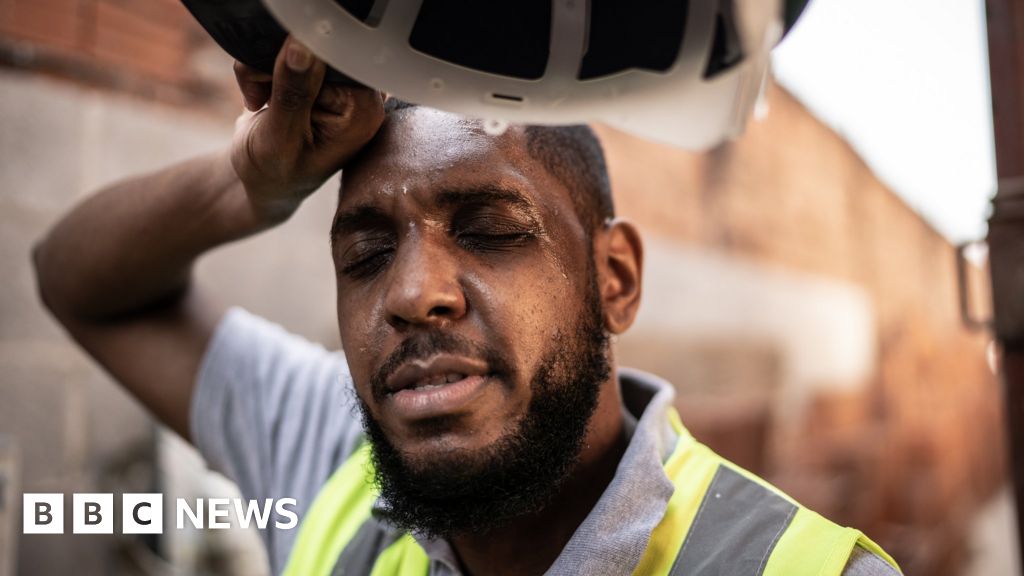Heatwave: When Is It Too Hot To Work?

By Jennifer Meierhans
BBC News
Much of the UK is already sweltering in a heatwave, and temperatures are set to keep rising.
What rights do workers have when temperatures soar?
Is there a maximum temperature for workplaces?
No law in the UK says a given temperature is too hot or cold to work.
But workplaces should ideally be at least 16C - or 13C if the job is mostly physical - according to the Health and Safety Executive (HSE).
A number of MPs recently backed a campaign for a legal upper limit of 30C in most workplaces - or 27C for those doing strenuous work - but the government doesn't have to respond.
What are my rights?
Whether your employer allows you to avoid going to work because it's too hot "is a matter for them", according to Mark Scoggins, solicitor advocate at Fisher Scoggins Waters.
"The HSE won't issue any guidance on that and they shouldn't," he added.
But the Health and Safety at Work Act means bosses are generally responsible for employees' welfare.
The Unite union says employers have "a legal and moral duty to ensure workers' health is not damaged during the current hot weather."
The HSE encourages staff to talk to their bosses if the workplace isn't comfortable.
What can employers do to cool things down?
The HSE says employers should let staff work flexibly where possible - shifting their hours to minimise working at the hottest times of day.
Relaxing formal dress codes and moving workstations away from hot places or out of direct sunlight can also help.
Where possible windows should be opened, radiators should be switched off, and fans or air-conditioning units should be available.
The TUC says businesses should let office staff work from home or adjust their hours to avoid rush-hour travel.
What about people who work outside?
Unite says manual workers are particularly vulnerable:
"Employers should consider rescheduling work to cooler times of the day, and provide cooling areas such as shade or air-conditioned rest rooms.
"If workers show any signs of heat exhaustion, the employer should immediately ensure they stop work and are allowed to recover, without loss of pay."
Image source, Getty Images
But Construction Industry Council chair Justin Sullivan says building sites' operating hours are often limited by planning laws designed to minimise their impact on surrounding communities. So starting early or finishing late isn't always an option.
However, he agrees that all workers should have access to water, protective clothing and shade.
Some materials like paint and concrete can't be used on extremely hot days as the heat causes the materials to fail. He says all site managers have temperature gauges, and switch workers to different jobs where possible.
Image source, Getty Images
Lifeguards are especially important in hot weather, when more people are tempted to swim, but they also need to look after themselves.
All lifeguards should have cold water, a wide-brimmed hat, a long-sleeved top, polarised sunglasses, a high factor sunscreen and access to shade, according to Jo Talbot from the Royal Life Saving Society UK.
They should also have regular breaks.
Will schools close because of the heat?
The Department for Education told the BBC it was "not expecting nor advising schools to close" during this summer's heatwave, and that "individual school leaders are responsible for managing their own local circumstances".
Its guidance recommends that schools boost ventilation where possible, keep children hydrated, and avoid vigorous physical activity. Pupils are also advised to wear a hat and use sun cream.
Image source, Getty Images
The NASUWT union says high temperatures make teaching and learning more difficult.
"Excessive heat in classrooms has been shown in many studies to impact on pupils' learning, with a 1°C increase in temperatures linked to a 2% decline in learning".
It says schools should avoid using classrooms which are particularly susceptible to high temperatures during the hottest hours of the day to help protect staff and pupils.
How can I keep cool at work?
There are some simple things individuals can do to make the heat more bearable.
Dr Anna Mavrogianni, who researches sustainable building and urban design at University College London, advises opening windows to improve airflow but working away from them to avoid direct heat.
Light-coloured clothing is cooler than dark, as it absorbs less heat. Choose looser-fitting garments made from natural materials like cotton and linen, which are more breathable.
To stay hydrated, drink water before you feel thirsty, and avoid heavy meals which require more digestion, in turn producing more body heat.
From Chip War To Cloud War: The Next Frontier In Global Tech Competition
The global chip war, characterized by intense competition among nations and corporations for supremacy in semiconductor ... Read more
The High Stakes Of Tech Regulation: Security Risks And Market Dynamics
The influence of tech giants in the global economy continues to grow, raising crucial questions about how to balance sec... Read more
The Tyranny Of Instagram Interiors: Why It's Time To Break Free From Algorithm-Driven Aesthetics
Instagram has become a dominant force in shaping interior design trends, offering a seemingly endless stream of inspirat... Read more
The Data Crunch In AI: Strategies For Sustainability
Exploring solutions to the imminent exhaustion of internet data for AI training.As the artificial intelligence (AI) indu... Read more
Google Abandons Four-Year Effort To Remove Cookies From Chrome Browser
After four years of dedicated effort, Google has decided to abandon its plan to remove third-party cookies from its Chro... Read more
LinkedIn Embraces AI And Gamification To Drive User Engagement And Revenue
In an effort to tackle slowing revenue growth and enhance user engagement, LinkedIn is turning to artificial intelligenc... Read more

